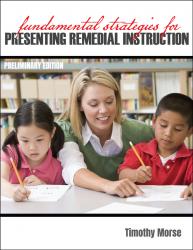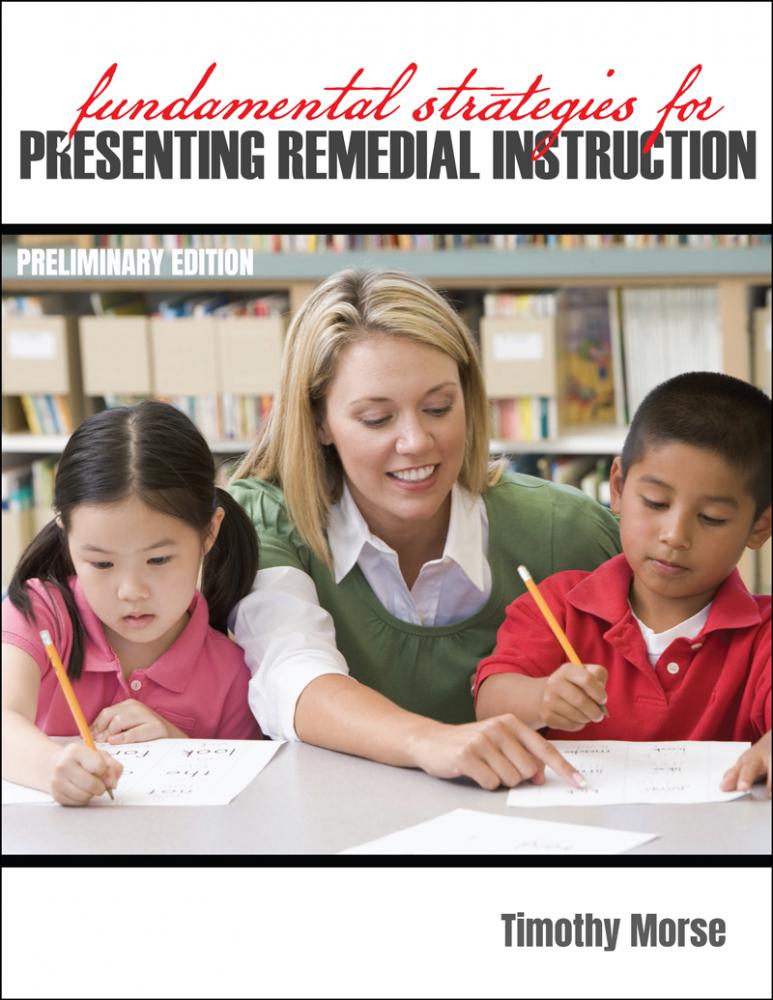Fundamental Strategies for Presenting Remedial Instruction, Preliminary Edition
Author(s): Timothy Morse
Edition: 0
Copyright: 2021
Pages: 136
Choose Your Platform | Help Me Choose
Fundamental Strategies for Presenting Remedial Instruction analyzes the design and implementation of remedial instruction to students with and without disabilities.
It defines remedial instruction provided to certain students beyond their general education classroom instruction to enhance their academic achievement deficits. Consequently, the publication repeatedly emphasizes how remedial instruction must be designed and implemented so that it is not “more of the same” type of large group, general education classroom instruction that has proven to be less than optimally effective for the students who need to receive remedial instruction.
Timothy Morse’s Fundamental Strategies for Presenting Remedial Instruction:
- addresses 1:1 and small group instruction, proper time management and environmental arrangements, the use of behavioral supports, assessment, and explicit trial-based instruction.
- discusses instruction within the context of school wide, multi-tiered systems of support, and the specific approach for presenting a lesson emphasizes providing students with a maximum number of opportunities to respond and receive feedback.
- emphasizes the importance of providing students with opportunities to respond and receive feedback as two key features of the intensive instruction that is called for within multi-tiered systems of support when remedial instruction is warranted.
While Fundamental Strategies for Presenting Remedial Instruction is designed for pre-service special and general education teachers, the book’s content will be useful to any individual tasked with presenting remedial instruction to students demonstrating academic achievement deficits.
Preface
Chapter 1 Introduction to Remedial Instruction
Remedial Instruction: A Primer
Approaches to Remedial Instruction
Two Types of Remedial Instruction in Schoolwide Accountability Models
Strategies for Intensifying Remedial Instruction
Systematic Trial-Based Instruction as a Core Component of Remedial Instruction
Check for Understanding
References
Answer Key
Chapter 2 Distinguishing General Education Classroom Instruction from Remedial Instruction
Moving from General Education Classroom Instruction to Remedial Instruction
General Planning Considerations for Effective Instruction
Curriculum
Time
Instructional Strategies
Assessment
Environmental Arrangement
Considerations for Proper Environmental Arrangements for Effective Remedial Instruction
Check for Understanding
References
Answer Key
Chapter 3 Instructional Arrangements for Remedial Instruction
Overview of Instructional Arrangements for Remedial Instruction
Introduction to Presenting Remedial Instruction in a 1:1 Instructional Arrangement
Introduction to Presenting Remedial Instruction in a Small Group Arrangement
Detailed Guidance About 1:1 Remedial Instruction
Preparation for 1:1 Remedial Instruction
Detailed Guidance for Presenting Small Group Remedial Instruction
Preparation for Small Group Remedial Instruction
Check for Understanding
References
Answer Key
Chapter 4 Systematic Trial-Based Instruction: A Foundation for Remedial Instruction
Systematic Trial-Based Instruction as a Foundation for Remedial Instruction
Systematic Trial-Based Instruction’s Three Basic Components and Corresponding Phases
Discrete Trial Teaching and Response Prompting Strategies: Examples of Trial-Based Approaches to Instruction
Variants: Instructional Strategies for Individualizing Remedial Instruction
Instructional Density
Reasons Supporting the Use of Systematic Trial-Based Instruction
Examples of Systematic Trials
Check for Understanding
References
Answer Key
Chapter 5 Presenting Explicit, Remedial Instruction
Explicit, Remedial Instruction
Elements of Explicit Instruction
Additional Elements of an Explicit Instruction Lesson
Example Explicit Instruction Lesson Plans
Systematic Trial-Based Instruction Within the Context of an Abridged Explicit Instruction Lesson
Behavioral Supports
Check for Understanding
References
Answer Key
Chapter 6 Assessment
Assessment for Remedial Instruction
Assessment: Key Concepts and Terms
Remedial Instruction Within the Context of School Assessment
Planning Considerations for Remedial Instruction Assessment
Explicit Instruction for Assessments
A Trial-Based Approach to Remedial Instruction Assessment
Check for Understanding
References
Answer Key
Glossary
Fundamental Strategies for Presenting Remedial Instruction analyzes the design and implementation of remedial instruction to students with and without disabilities.
It defines remedial instruction provided to certain students beyond their general education classroom instruction to enhance their academic achievement deficits. Consequently, the publication repeatedly emphasizes how remedial instruction must be designed and implemented so that it is not “more of the same” type of large group, general education classroom instruction that has proven to be less than optimally effective for the students who need to receive remedial instruction.
Timothy Morse’s Fundamental Strategies for Presenting Remedial Instruction:
- addresses 1:1 and small group instruction, proper time management and environmental arrangements, the use of behavioral supports, assessment, and explicit trial-based instruction.
- discusses instruction within the context of school wide, multi-tiered systems of support, and the specific approach for presenting a lesson emphasizes providing students with a maximum number of opportunities to respond and receive feedback.
- emphasizes the importance of providing students with opportunities to respond and receive feedback as two key features of the intensive instruction that is called for within multi-tiered systems of support when remedial instruction is warranted.
While Fundamental Strategies for Presenting Remedial Instruction is designed for pre-service special and general education teachers, the book’s content will be useful to any individual tasked with presenting remedial instruction to students demonstrating academic achievement deficits.
Preface
Chapter 1 Introduction to Remedial Instruction
Remedial Instruction: A Primer
Approaches to Remedial Instruction
Two Types of Remedial Instruction in Schoolwide Accountability Models
Strategies for Intensifying Remedial Instruction
Systematic Trial-Based Instruction as a Core Component of Remedial Instruction
Check for Understanding
References
Answer Key
Chapter 2 Distinguishing General Education Classroom Instruction from Remedial Instruction
Moving from General Education Classroom Instruction to Remedial Instruction
General Planning Considerations for Effective Instruction
Curriculum
Time
Instructional Strategies
Assessment
Environmental Arrangement
Considerations for Proper Environmental Arrangements for Effective Remedial Instruction
Check for Understanding
References
Answer Key
Chapter 3 Instructional Arrangements for Remedial Instruction
Overview of Instructional Arrangements for Remedial Instruction
Introduction to Presenting Remedial Instruction in a 1:1 Instructional Arrangement
Introduction to Presenting Remedial Instruction in a Small Group Arrangement
Detailed Guidance About 1:1 Remedial Instruction
Preparation for 1:1 Remedial Instruction
Detailed Guidance for Presenting Small Group Remedial Instruction
Preparation for Small Group Remedial Instruction
Check for Understanding
References
Answer Key
Chapter 4 Systematic Trial-Based Instruction: A Foundation for Remedial Instruction
Systematic Trial-Based Instruction as a Foundation for Remedial Instruction
Systematic Trial-Based Instruction’s Three Basic Components and Corresponding Phases
Discrete Trial Teaching and Response Prompting Strategies: Examples of Trial-Based Approaches to Instruction
Variants: Instructional Strategies for Individualizing Remedial Instruction
Instructional Density
Reasons Supporting the Use of Systematic Trial-Based Instruction
Examples of Systematic Trials
Check for Understanding
References
Answer Key
Chapter 5 Presenting Explicit, Remedial Instruction
Explicit, Remedial Instruction
Elements of Explicit Instruction
Additional Elements of an Explicit Instruction Lesson
Example Explicit Instruction Lesson Plans
Systematic Trial-Based Instruction Within the Context of an Abridged Explicit Instruction Lesson
Behavioral Supports
Check for Understanding
References
Answer Key
Chapter 6 Assessment
Assessment for Remedial Instruction
Assessment: Key Concepts and Terms
Remedial Instruction Within the Context of School Assessment
Planning Considerations for Remedial Instruction Assessment
Explicit Instruction for Assessments
A Trial-Based Approach to Remedial Instruction Assessment
Check for Understanding
References
Answer Key
Glossary



